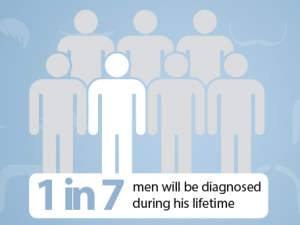 One of the statistics that stood out to us in our last post was that men have about a 1 in 7 chance of getting prostate cancer in their lifetime1. With a number like that staring men in the face, it can be helpful to know the risk factors.
One of the statistics that stood out to us in our last post was that men have about a 1 in 7 chance of getting prostate cancer in their lifetime1. With a number like that staring men in the face, it can be helpful to know the risk factors.
Often the conversation about prostate cancer focuses on a man’s age, ethnicity, and family history. But these factors are out of his control. We thought we’d share a couple of factors we found on cancer.org that are within a man’s control to act upon in order to reduce his risk.
Diet
The exact role of diet in prostate cancer is not clear, but several factors have been studied. Men who eat a lot of red meat or high-fat dairy products appear to have a slightly higher chance of getting prostate cancer. These men also tend to eat fewer fruits and vegetables. Doctors aren’t sure which of these factors is responsible for raising the risk.Obesity
Some studies have found that obese men have a lower risk of getting a low-grade (less dangerous) form of the disease, but a higher risk of getting more aggressive prostate cancer. The reasons for this are not clear. Some studies have also found that obese men may be at greater risk for having more advanced prostate cancer and of dying from prostate cancer, but not all studies have found this.
Men can reduce their chances of prostate cancer by improving their dietary choices and their habits. But it’s not just men who should be paying attention. While you have to have a prostate to have prostate cancer, this disease can certainly have a significant (albeit indirect) effect on women as well. Women should consider talking to the men in their lives about prostate cancer, especially if there’s something that can be done to reduce their risk.
Read more about the risk factors for prostate cancer at cancer.org.
1cancer.org/cancer/prostatecancer/index